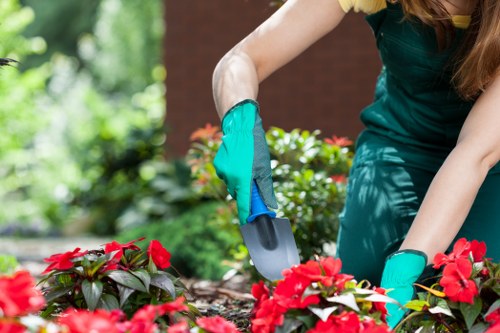Effective Oil Stain Removal for Driveways in Uxbridge

Oil stains on driveways can be both unsightly and challenging to remove. Whether you’ve accidentally spilled oil while gardening or your car has had a leak, dealing with these stains promptly and effectively is crucial to maintaining the appearance and longevity of your driveway. In Uxbridge, homeowners face unique challenges due to the region’s climate and the variety of driveway materials commonly used.
Understanding the right methods and products for oil stain removal can save you time, money, and effort. This article explores the best practices for eliminating oil stains from driveways in Uxbridge, ensuring your driveway remains clean and attractive year-round.
Whether you have a concrete, asphalt, or gravel driveway, there are specific techniques tailored to each surface. Additionally, local resources in Uxbridge can provide support and professional services if needed.

Understanding Oil Stains
Oil stains occur when petroleum-based products come into contact with driveway surfaces. Common sources include vehicle leaks, oil spills from machinery, and spills from cooking oils. Over time, these stains can penetrate deeply into the driveway material, making them harder to remove.
Different driveway materials react differently to oil stains. For instance, concrete driveways tend to absorb oil quickly, while asphalt driveways might repel some of it but still retain stains over time. Gravel driveways, on the other hand, can shift and scatter oil, making cleanup more challenging.
Recognizing the type of oil stain and the driveway material is the first step in determining the most effective removal method.

Preparation Before Stain Removal
Before tackling oil stains, it’s essential to prepare the area properly. Gather the necessary materials, which may include absorbent materials like kitty litter or baking soda, cleaning agents such as dish soap or specialized driveway cleaners, brushes, and protective gloves.
Protecting surrounding areas is also important. Use plastic sheets or old newspapers to cover plants, sidewalks, and other surfaces to prevent accidental staining during the cleaning process.
Additionally, addressing oil stains promptly can prevent them from setting in. The longer an oil stain remains untreated, the more difficult it becomes to remove.

Step-by-Step Oil Stain Removal Methods
1. Absorption Technique
This method is best for fresh stains. Apply an absorbent material like kitty litter, baking soda, or commercial absorbents to the stain. Let it sit for several hours or overnight to soak up the oil.
After the absorbent has absorbed the oil, sweep it away and dispose of it properly. Repeat the process if necessary until the stain is no longer visible.
2. Soap and Hot Water
For more stubborn stains, mixing dish soap with hot water can help break down the oil. Scrub the area with a stiff brush, ensuring the solution penetrates the stain.
Rinse the area thoroughly with a hose, allowing the soap and loosened oil to wash away. This method is effective for both concrete and asphalt driveways.
3. Commercial Driveway Cleaners
There are numerous commercial products designed specifically for oil stain removal. These cleaners often contain powerful solvents that break down oil molecules, making them easier to remove.
Follow the manufacturer’s instructions carefully, as some products may require specific application techniques or safety precautions.
4. Pressure Washing
For extensive staining, a pressure washer can be highly effective. The high-pressure water jets remove oil and grime from the surface, leaving the driveway looking clean.
However, care must be taken to avoid damaging the driveway material, especially with more delicate surfaces like gravel or older concrete.

Preventive Measures to Avoid Future Stains
Prevention is always better than cure. Here are some tips to minimize the occurrence of oil stains on your driveway:
- Regular Maintenance: Inspect your vehicles and machinery regularly for leaks and address them promptly.
- Use Protective Mats: Place mats or trays under engines or machinery to catch any spills.
- Immediate Cleanup: Attend to spills as soon as they occur to prevent oil from seeping into the driveway material.
- Seal Your Driveway: Sealing concrete or asphalt can create a barrier that resists oil penetration.
- Proper Ventilation: Ensure that areas where oil is used are well-ventilated to reduce the chance of accidental spills.
Local Services in Uxbridge for Oil Stain Removal
If DIY methods aren’t effective or if you prefer professional assistance, Uxbridge offers several services specializing in driveway cleaning and oil stain removal. These professionals use advanced techniques and equipment to ensure thorough cleaning without damaging your driveway.
Hiring a local service ensures that the team is familiar with the specific challenges posed by Uxbridge’s climate and driveway materials. They can also provide ongoing maintenance services to keep your driveway in top condition.
Cost Considerations
The cost of oil stain removal in Uxbridge can vary based on the severity of the stain, the size of the driveway, and the method chosen. DIY methods are generally more affordable, requiring only basic materials. However, for extensive staining or large driveways, professional services might be more cost-effective in the long run.
It’s advisable to obtain quotes from multiple service providers to compare prices and services offered. Remember that investing in quality cleaning can enhance the curb appeal and value of your property.
Environmental Impact
When removing oil stains, it’s important to consider the environmental impact of the methods used. Some commercial cleaners contain harsh chemicals that can harm plants and wildlife if not used properly.
Opting for eco-friendly products or natural cleaning solutions can minimize environmental harm. Additionally, proper disposal of used absorbents and cleaning materials prevents oil from entering the soil and waterways.
Maintenance Tips for a Cleaner Driveway
Maintaining a clean driveway goes beyond just removing stains. Regular maintenance can prevent minor issues from becoming major problems:
- Regular Cleaning: Sweep your driveway regularly to remove debris that can trap oil and other substances.
- Seal Coating: Reapply sealant every few years to protect the driveway from oil penetration and weather damage.
- Prompt Repairs: Fix any cracks or damage immediately to prevent oil from seeping in and creating stains.
- Proper Drainage: Ensure that water drains away from the driveway to prevent pooling, which can attract oil and other stains.
Choosing the Right Products
With numerous products available for oil stain removal, selecting the right one for your driveway is essential. Consider the following factors:
- Driveway Material: Ensure the cleaner is suitable for your specific driveway material to avoid damage.
- Environmental Safety: Choose products that are environmentally friendly, especially if your driveway is near plants or water sources.
- Effectiveness: Read reviews and seek recommendations to find products that reliably remove oil stains.
- Ease of Use: Opt for products that are easy to apply and require minimal effort for maximum results.
DIY vs. Professional Services
Deciding between a DIY approach and hiring professionals depends on several factors:
- Severity of the Stain: Minor stains can often be handled with DIY methods, while heavy staining may require professional intervention.
- Time and Effort: DIY methods can be time-consuming, especially for large driveways or persistent stains.
- Cost: While DIY is generally cheaper upfront, extensive stains might incur higher costs if left untreated, potentially outweighing professional service fees.
- Expertise: Professionals have the experience and equipment to handle tough stains efficiently and safely.
Safety Precautions
Handling oil stain removal involves certain safety precautions to protect yourself and your property:
- Protective Gear: Wear gloves and eye protection when handling cleaning agents and chemicals.
- Ventilation: Ensure good ventilation when using chemical cleaners to prevent inhaling harmful fumes.
- Proper Storage: Store cleaning products safely away from children and pets.
- Follow Instructions: Always follow the manufacturer’s instructions for any cleaning product to ensure safe and effective use.
Long-Term Benefits of a Clean Driveway
Maintaining a clean driveway offers several long-term benefits:
- Enhanced Curb Appeal: A spotless driveway boosts the overall appearance of your property.
- Increased Property Value: Well-maintained driveways contribute to the value of your home.
- Longevity: Regular cleaning and maintenance prevent deterioration, extending the lifespan of your driveway.
- Safety: Removing oil stains eliminates slippery spots, reducing the risk of accidents.
Conclusion
Oil stains on driveways in Uxbridge are a common issue that can be effectively managed with the right techniques and products. Whether you choose to handle the removal yourself or seek professional assistance, maintaining a clean driveway is essential for both aesthetics and functionality.
By understanding the best practices for oil stain removal and implementing preventive measures, you can ensure your driveway remains in excellent condition for years to come.
Nearby Areas for Oil Stain Removal Driveway Services in Uxbridge
- East Uxbridge
- West Uxbridge
- North Uxbridge
- South Uxbridge
- Downtown Uxbridge
- Uxbridge Lakes
- Uxbridge Hills
- Eastwood Uxbridge
- Uxbridge Meadows
- Sunnyvale Uxbridge
- Greenfield Uxbridge
- Riverside Uxbridge
- Uxbridge Park
- Harbor Uxbridge
- Lakeside Uxbridge
Frequently Asked Questions
1. What is the best way to remove old oil stains from a concrete driveway?
The best way to remove old oil stains from a concrete driveway is to use a combination of absorbent materials and strong cleaning agents. Start by applying an absorbent like kitty litter or baking soda to soak up any remaining oil. Then, scrub the area with a mixture of dish soap and hot water or a commercial concrete cleaner. Rinse thoroughly and repeat if necessary.
2. Can I use household products to clean oil stains on an asphalt driveway?
Yes, you can use household products like dish soap, baking soda, and vinegar to clean oil stains on an asphalt driveway. Apply the soap and water mixture, scrub the stain, and rinse it off. For more stubborn stains, consider using a degreaser or a specialized asphalt cleaner.
3. How can I prevent oil stains from recurring on my driveway?
Prevent oil stains by regularly maintaining your vehicles and machinery to prevent leaks, promptly cleaning any spills, sealing your driveway to create a protective barrier, and using protective mats or trays under engines to catch any accidental spills.
4. Are there environmentally friendly solutions for oil stain removal?
Yes, there are environmentally friendly solutions for oil stain removal. You can use natural absorbents like baking soda or cornstarch, eco-friendly detergents, and biological cleaners that break down oil without harming the environment. Always dispose of used materials properly to prevent environmental contamination.
5. When should I hire a professional for oil stain removal?
You should consider hiring a professional for oil stain removal if the stains are extensive, deeply embedded, or if DIY methods have proven ineffective. Professionals have access to specialized equipment and products that can handle tough stains efficiently and safely.


